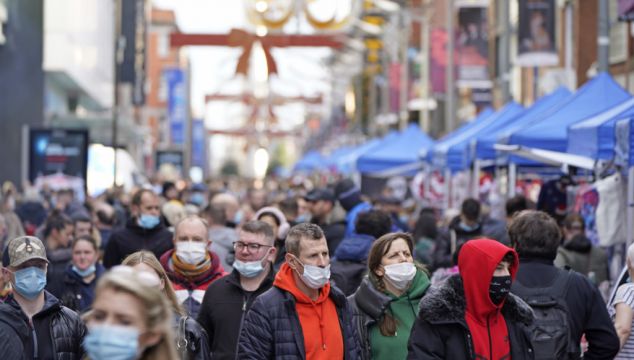Updated at 9.22 am
Professor of Immunology Paul Moynagh has called for a long term plan for coping with Covid-19.
Current measures are leading to a “wall of immunity”, he told Newstalk Breakfast. But there needed to be a long term plan, he urged.
The high numbers of people who had already been infected, the success of the vaccination programme and the subsequent booster programme would protect against new infections, Professor Moynagh explained.
However, this could wane in time which was why there was a need for a long term plan, he added.
According to Professor Moynagh, while officially half a million cases had been identified in the past eight weeks, and the one million cases mark was reached this week, in reality the figure was more likely to be 1.5 million.
The virus was now going to find it difficult to find new people to infect, he said.
The success of the vaccine campaign was the reason why ICU numbers were steady, he added. All the efforts to date had helped build the “wall of immunity” and that was how the country would get out of the pandemic.
Professor Moynagh also said that he did not understand why approval for FFP2/N5 masks had been withheld until now.
“We’re coming to this very late” he said, commenting that all the evidence showed that the higher grade masks performed very well and were better than cloth masks.
Better protection
Prof Moynagh's comments come as the National Public Health Emergency Team (Nphet) has advised the Government that higher-grade respirator masks may give better protection to people who are at high risk from Covid-19.
As reported in The Irish Times, Nphet has said that people can choose to wear FFP3 masks, and the slightly lower-grade FFP2 respirator or medical masks, instead of cloth masks if they wish.
However, the advisory group did not recommend the higher-grade masks to the public instead of cloth ones.
Nphet advised a respirator or medical mask should ideally be worn by anyone who is a confirmed case while infectious, who has Covid-19 symptoms, who is a household contact of a case, anyone who is visiting a healthcare setting or a vulnerable person.
It was also stressed that respirator and medical masks should be prioritised for healthcare workers.
The new advice comes following a request from the Minister for Health Stephen Donnelly for the use of higher grade masks to be examined.
In other countries around Europe, such as Germany, Austria and Italy, the use of FFP2 or equivalent masks have been intodueced in public spaces.
Mandatory vaccines
On Monday, Taoiseach Micheál Martin ruled out the introduction of mandatory vaccination in Ireland. Mr Martin said the system of voluntary vaccination would be maintained.
His comments came following reports that Nphet would be considering the issue following new advice issued from the European Centre for Disease Control (ECDC) for countries which are experiencing extreme stress on their healthcare systems.
"First of all, I think Nphet will examine every issue - it will give advice to Government from time to time. I have been very clear in that I favour the voluntary approach to vaccination," Mr Martin said.
It is understood that Dr Holohan and senior Nphet figures are considering the ECDC advice, which may go to Cabinet on Wednesday.
According to one source, it is unlikely that there will be a wider relaxation of current isolation rules for close contacts among the public before the current Omicron wave of infection peaks.
Taoiseach Micheál Martin said the latest wave is not expected to peak for another seven days or even a fortnight.
It comes as there were 23,909 new cases of the virus confirmed on Monday, bringing the State's total case count to 1,002,013 since February 2020.
Meanwhile, there were 1,063 people with the virus in hospital, up 79 on Sunday's figures.
This is the first time Covid-19 hospitalisations have surpassed the 1,000-mark since February last year.
- Additional reporting by Vivienne Clarke







